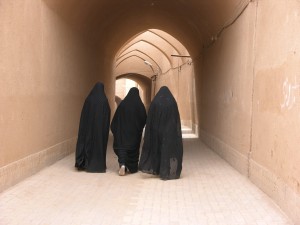Irak: Fatwa erlaubt Genitalverstümmelung
FGM in Kurdistan: Der Stand der Dinge
8. Juli 2010WÜSTENBLUME-Verlosung
13. Juli 2010 The Higher Committee of Fatwa in Kurdish Iraq recently issued a fatwa on FGM. This fatwa openly contradicts the fatwa from Al-Azhar university issued in 2006, banning FGM from a religious point of view.
The Higher Committee of Fatwa in Kurdish Iraq recently issued a fatwa on FGM. This fatwa openly contradicts the fatwa from Al-Azhar university issued in 2006, banning FGM from a religious point of view.
In contrary the Kurdish clerics delegate the decision – to mutilate or not – back to the families. They additionally underline that FGM is considered Sunnah in most Islamic Law Schools.
A lot of people and activists in Iraqi-Kurdistan are frustrated with this text and start a process of discussing how to proceed with the campaign against FGM.
 The Higher Committee of Fatwa in Kurdish Iraq recently issued a fatwa on FGM. This fatwa openly contradicts the fatwa from Al-Azhar university issued in 2006,banning FGM from a religious point of view.
The Higher Committee of Fatwa in Kurdish Iraq recently issued a fatwa on FGM. This fatwa openly contradicts the fatwa from Al-Azhar university issued in 2006,banning FGM from a religious point of view.
In contrary the Kurdish clerics delegate the decision – to mutilate or not – back to the families. They additionally underline that FGM is considered Sunnah in most Islamic Law Schools.
A lot of people and activists in Iraqi-Kurdistan are frustrated with this text and start a process of discussing how to proceed with the campaign against FGM.
We also want to draw your attention to two new articles about FGM, one published by the Guardian, one by Time Magazine.
Here is the fatwa in English:
We also want to draw your attention to two new articles about FGM, one published by the Guardian, one by Time Magazine.
Fatwa on FGM in Kurdish Iraq
With regard to ruling about FGM in the Islamic Jurisprudence, and also what is the view of the Higher Committee for Fatwa with regard to this issue. The Kurdistan High Committee for Fatwa in Kurdistan is responding as follows;
Before answering we would like to present this introduction; in fact Islam didn’t introduce FGM, but it is an old traditional practice that was prevalent among ancient people.
The famous ancient Greek historian Herodotus says those who did FGM in ancient times were the Egyptians, Assyrians, Kussidiuns and Ethiopians. Other people learned the practice from Egyptians.
Sheikh Mahmood Shaltot, the previous Sheikh of AL-Azhar says the practice of FGM is an ancient one, many people did that since the start of history, they continued doing so even until the appearance of Islam.
What is important for us here is that the Arabs knew about FGM before the appearance of Islam. They were doing it for both men and women. It was so prevalent among them, it became a tradition.
The religious scientists of Islam are divided into three groups in terms of their stance on FGM:
The first Opinion: They regard circumcision an obligation for both men and women. This is the idea of most of the Shafies.
The Second Opinion: They regard it as a Sunnah of the prophet. This is the idea of Abu Hanifa, Malik and a number of Shafy followers and Hasany Basri.
The Third Opinion: Circumcision in men is an obligation while it is a Sunnah for women and not an obligation This is the idea of Imam Ahmad.
Summary: most of the religious scientists of Islam are sayings FGM is Sunnah and awarded for women and not an obligation and it’s obvious that by doing a Sunnah people will be awarded for doing it and will not be criminalized for not doing it. Therefore FGM is not something that must be done; the person who is not doing it is not regarded as a criminal.
Most of the prophetical sayings with regard to FGM are weak ones. In that regard Abo Dawd says: The sayings about FGM are presented in many different ways. All of them are weak and cannot be regarded as a proof.
The Minawy Imam in the (Faith Al-Qadir) book and the writer of (Nail Al-Awtar) is quoting Ibin Munazir by saying: there is no dependable prophetical saying about FGM and its not Sunnah to do it.
Conclusion:
The parents of the girl are free to practice FGM or not, but when it becomes surerly clear from the health point of view that FGM is without doubt harmful either acutely or chronically for the woman, not doing it is better, and this is based on the provision of “No Damage and Do no harm” and “You should not harm neither yourself or others”.
The Higher Committee of Fatwa in Kurdistan, July 6th 2010
Here you find the Original text in Kurdish.
Translated from Kurdish by Goran Sabir
Here is the fatwa in English:
Fatwa on FGM in Kurdish Iraq
With regard to ruling about FGM in the Islamic Jurisprudence, and also what is the view of the Higher Committee for Fatwa with regard to this issue. The Kurdistan High Committee for Fatwa in Kurdistan is responding as follows;
Before answering we would like to present this introduction; in fact Islam didn’t introduce FGM, but it is an old traditional practice that was prevalent among ancient people.
The famous ancient Greek historian Herodotus says those who did FGM in ancient times were the Egyptians, Assyrians, Kussidiuns and Ethiopians. Other people learned the practice from Egyptians.
Sheikh Mahmood Shaltot, the previous Sheikh of AL-Azhar says the practice of FGM is an ancient one, many people did that since the start of history, they continued doing so even until the appearance of Islam.
What is important for us here is that the Arabs knew about FGM before the appearance of Islam. They were doing it for both men and women. It was so prevalent among them, it became a tradition.
The religious scientists of Islam are divided into three groups in terms of their stance on FGM:
The first Opinion: They regard circumcision an obligation for both men and women. This is the idea of most of the Shafies.
The Second Opinion: They regard it as a Sunnah of the prophet. This is the idea of Abu Hanifa, Malik and a number of Shafy followers and Hasany Basri.
The Third Opinion: Circumcision in men is an obligation while it is a Sunnah for women and not an obligation This is the idea of Imam Ahmad.
Summary: most of the religious scientists of Islam are sayings FGM is Sunnah and awarded for women and not an obligation and it’s obvious that by doing a Sunnah people will be awarded for doing it and will not be criminalized for not doing it. Therefore FGM is not something that must be done; the person who is not doing it is not regarded as a criminal.
Most of the prophetical sayings with regard to FGM are weak ones. In that regard Abo Dawd says: The sayings about FGM are presented in many different ways. All of them are weak and cannot be regarded as a proof.
The Minawy Imam in the (Faith Al-Qadir) book and the writer of (Nail Al-Awtar) is quoting Ibin Munazir by saying: there is no dependable prophetical saying about FGM and its not Sunnah to do it.
Conclusion:
The parents of the girl are free to practice FGM or not, but when it becomes surerly clear from the health point of view that FGM is without doubt harmful either acutely or chronically for the woman, not doing it is better, and this is based on the provision of “No Damage and Do no harm” and “You should not harm neither yourself or others”.
The Higher Committee of Fatwa in Kurdistan, July 6th 2010
Here you find the Original text in Kurdish.
Translated from Kurdish by Goran Sabir






2 Comments
Gute Internetseite! Viel Erfolg!
Lieber Thomas,
das ist sehr freundlich. Schauen Sie gern regelmäßig bei uns vorbei!
Ihr TaskForce-Team